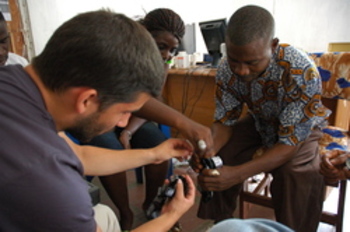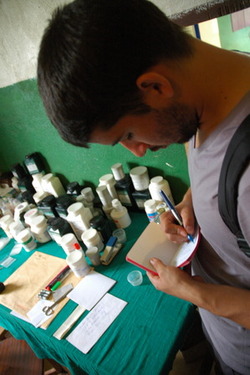Carlo Canepa - Tiyatien Health in Zwedru, Liberia
by Carlo Canepa
 Carlo leads a training session on solar-powered head lamps
Carlo leads a training session on solar-powered head lamps
Liberia: it's hard to know what to expect. A few ideas come to mind: bucket showers, friendly faces, a rich culture, and crippling poverty exacerbated by civil war. But what do I, a first year medical student, know beyond that? And amidst that unknown, where do I fit? Not even the visa application offers direction: am I a tourist or am I here on business?
Tiyatien Health means "justice in health" in the dialect of the Krahn people of southeastern Liberia. Since 2007 TH has been serving a community of mostly farmers and unskilled laborers in a town called Zwedru. Initially it focused on HIV and AIDS treatment, but like most other places, it was only the beginning of bringing equity to health care. It had to expand to tuberculosis, maternal mortality, and now chronic illnesses and mental health. With the assistance of U.S.-based physicians and health professionals and an entirely national staff, TH is building the infrastructure at Martha Tubman Memorial Hospital and leading unique home-based care model for decentralizing care. So where does a medical student fresh from his first year fit? What can I possibly do that someone who has survived war, starvation, and been a refugee for nearly a decade cannot? I offered my services to the executive director of Tiyatien, Dr. Rajesh Panjabi of Massachusetts General Hospital, and stated that I would do whatever the organization needed. My one stipulation was that my projects would have lasting change. I didn't want to take part in a research project that would perhaps make me an author on a paper or facilitate a presentation at a conference, but not translate into an improvement in the lives of the patients. One would figure that after the first year of medical school your skill set would expand tremendously and you'd be capable of doing things that were once a distant dream. That is why I decided to become a doctor: to develop a skill set that would be invaluable wherever I went and could bring about change specifically in the health of others. The reality is something slightly more mundane, yet, in my opinion, equally as important to ideals of global health and social justice. After one year of intense biochemistry, molecular biology, anatomy, and immunology, my most important skill set is still the same one that it was when I entered high school: the ability to read and a facility with computers. These are skills most American youth take for granted, yet in a place like Liberia, they are rare. And that is how I found myself near the border with Cote d'Ivoire, working with a non-governmental organization dedicated to improving the lives of the rural poor. We like to call it community health 2.0. It started with me leading computer classes for our community health worker leaders. Three times a week I taught my four students how to turn on a computer, type up their reports, and create a spreadsheet of their home visits. Slowly we ventured into presentations, the Internet, and Skype. The next step was training them to use solar panels and rechargeable batteries for their headlamps to save a couple of dollars a month. It went into full gallop when TH's main physician, Dr. Valentine Sawyerr, and I created a digital database of all 396 patients who had come to the hospital for HIV/AIDS treatment.
Needless to say I kept busy, really busy. A typical day involved me teaching class from 9 to 11, collecting headlamps and conducting interviews for our CHWs until 1pm, having a rice and palm butter lunch until 2, and then spending most of the afternoon at the hospital copying charts into the database. All the while I am troubleshooting the realities of life in rural Liberia: our generator is down so where do I hold class today? It's been raining for six days straight, so where can we charge the solar panels? And how can I slip in some time at UN High Commissioner for Human Rights' office so that I can check my email and Skype my mother?
It's both exciting and exhausting to be part of something that is expanding. Of course there were growing pains, that's to be expected, but working in a post-conflict country brings its unique obstacles. The staff has not had the luxury of a traditional education. Yet in such dire circumstances there are also tremendous opportunities to contribute and learn. I was part of a team that led a Global Fund visit at our hospital. I'm going to help analyze a data set on how to improve a community-based care program for 400 people living with HIV and AIDS. And I plan on being a part of future discussions about Tiyatien's expansion into mental health, chronic disease, and developing a new clinic in the neighboring county.

Carlo takes notes at a drug depot in the hospital
It wasn't what I expected of my one and only medical school summer. I didn't climb a mountain or go on safari. There was no beach to spend a weekend. And there weren't even souvenirs to buy. But I am proud of what I left behind. Whether it is hearing Dr. Sawyerr's voice lead a conference call on Skype or reading our P.A.'s monthly update on the TH website, I know my eight weeks in Zwedru made an impact on Tiyatien's staff. And inevitably they will be the ones to effect real changes in the lives of our patients.
For more information about the organization Carlo worked with please visit www.tiyatienhealth.org
Weill Cornell Medicine Center for Global Health
Center for Global Health
420 East 70th Street, 4th Floor, Suite LH-455
New York, NY 10021
Phone: (646) 962-8140
Fax: (646) 962-0285

